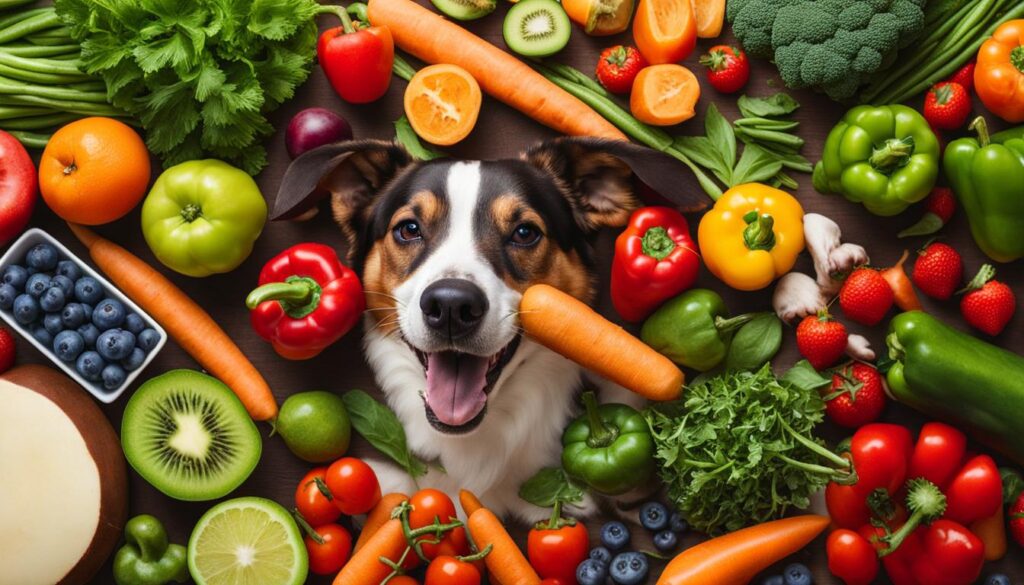Can Dogs Have Ritz Crackers? Safe Snack Guide
Are you wondering if it’s safe to give your dog Ritz crackers as a treat? While dogs can technically have Ritz crackers, it’s important to understand the potential risks and drawbacks before offering them to your furry friend. In this article, we’ll explore the nutritional value of Ritz crackers for dogs, potential risks associated with their consumption, and alternative snack options that are healthier and safer.
Key Takeaways:
- Ritz crackers are generally safe for dogs to eat but should not be a regular part of their diet.
- Ritz crackers lack significant nutritional benefits and are high in carbohydrates, salt, fat, and sugar.
- Feeding Ritz crackers to dogs can contribute to weight gain, obesity, pancreatitis, and other health issues.
- Healthy alternatives to Ritz crackers for dogs include fruits, vegetables, and dog-friendly snacks.
- It’s important to practice portion control and prioritize your dog’s overall well-being when offering snacks.
Are Ritz Crackers Nutritious for Dogs?
Ritz crackers may be a tasty treat for humans, but do they offer any nutritional benefits for our canine companions? Let’s take a closer look at the ingredients and nutritional value of Ritz crackers to determine their suitability as a dog-friendly snack.
Ritz crackers are primarily made of unbleached enriched flour, vegetable oils, sugar, salt, and high fructose corn syrup. While these ingredients may make the crackers flavorful for humans, they do not provide any significant nutritional benefits for dogs. Though Ritz crackers may contain small amounts of calcium and potassium, their overall nutritional value is low.
When it comes to finding suitable snacks for your furry friend, it’s important to choose options that offer essential nutrients and contribute to your dog’s overall health and well-being. While Ritz crackers may be safe for dogs to consume in moderation, they should not be relied upon as a nutritious snack choice.
Table: Nutritional Comparison of Ritz Crackers and Dog-Friendly Snacks
| Cracker/Snack | Calories per Serving | Protein (g) | Fat (g) | Fiber (g) | Calcium (mg) | Potassium (mg) |
|---|---|---|---|---|---|---|
| Ritz Crackers (6 crackers) | 79 | 1 | 4 | 0 | 6 | 12 |
| Apple Slices (1 medium apple) | 95 | 0.5 | 0.3 | 4.4 | 8 | 152 |
| Baby Carrots (10 carrots) | 35 | 1 | 0 | 3 | 20 | 360 |
| Peanut Butter (1 tablespoon) | 94 | 3.8 | 8 | 1.5 | 4 | 67 |
Note: The nutritional values are approximate and may vary depending on the specific brand and recipe.
As shown in the table above, Ritz crackers have a higher fat content and lower nutritional value compared to dog-friendly snack options such as apple slices, baby carrots, and peanut butter. These alternatives offer vitamins, minerals, and fiber, making them healthier choices for your four-legged friend.
It’s important to prioritize your dog’s overall well-being by providing them with snacks that offer nutritional benefits. Instead of relying on Ritz crackers, consider incorporating dog-friendly fruits and vegetables into their diet. Apples, carrots, and even small amounts of peanut butter can be excellent choices that contribute to your dog’s overall health.
https://www.youtube.com/watch?v=No_i3HOaYKM
Potential Risks of Feeding Ritz Crackers to Dogs
When it comes to feeding Ritz crackers to dogs, there are several potential risks that pet owners should be aware of. While these crackers may be a tempting snack, it’s important to consider the impact they can have on your dog’s health.
High Carbohydrate Content
Ritz crackers are high in carbohydrates, which can contribute to weight gain and obesity in dogs. Just like humans, dogs who consume an excess of carbohydrates can experience various health problems, including diabetes, joint issues, and overall reduced quality of life. It’s crucial to maintain a balanced diet for your canine companion and limit their intake of high-carb snacks like Ritz crackers.
Salt Intake Concerns
The salt content in Ritz crackers is another area of concern for dogs. While small amounts of salt are necessary for a dog’s diet, excessive intake can be harmful and even lead to salt poisoning. Dogs are more sensitive to salt than humans, and consuming too much salt can cause dehydration, increased thirst, and in severe cases, kidney problems. It’s important to be cautious and avoid overfeeding Ritz crackers, which can contribute to a high salt intake in dogs.
Increase in Fat and Sugar
Ritz crackers contain fat and sugar, which can be problematic for dogs, especially when consumed in large quantities. Excessive fat intake can lead to pancreatitis, a serious condition that causes inflammation of the pancreas. Digestive issues, such as upset stomach, diarrhea, and vomiting, can also arise from the consumption of high-fat and high-sugar foods like Ritz crackers. It’s important to prioritize your dog’s digestive health by offering them healthier snack alternatives.

By being aware of these potential risks, pet owners can make informed decisions about the snacks they give to their dogs. It’s important to prioritize your dog’s health and well-being by offering them dog-friendly snacks that provide essential nutrients without the associated risks.
Alternatives to Ritz Crackers for Dogs
If you’re looking for healthier snack options for your furry friend, there are plenty of alternatives to Ritz crackers that offer nutritional benefits and are safe for dogs to eat. Opting for these dog-friendly crackers will not only provide a tasty treat but also contribute to your dog’s overall well-being.
Fruits:
Consider offering your dog a variety of fruits that are rich in antioxidants and safe for canines. Some healthy fruit options for dogs include:
- Apples
- Bananas
- Blueberries
- Strawberries
These fruits are packed with vitamins and minerals that support your dog’s immune system and promote good health.
Vegetables:
Vegetables are another excellent choice for dog-friendly snacking. They provide essential nutrients and fiber while keeping your dog’s calorie intake in check. Some dog-friendly vegetables to consider include:
- Broccoli
- Carrots
- Green beans
- Sweet potatoes
These vegetables offer a range of vitamins, minerals, and antioxidants, ensuring your dog gets the nourishment they need.
Other Options:
If you’re looking for more variety in your dog’s snacks, you can also consider offering them:
- Squash
- Kale
- Pumpkin
- Watermelon (seedless)
These alternatives provide hydration, vitamins, and minerals, making them a great addition to your dog’s diet.
Remember, it’s important to introduce new snacks gradually and monitor your dog’s reaction to ensure they can tolerate and enjoy them. Variety is key when it comes to providing a balanced and nutritious snack menu for your furry friend.
| Snack | Benefits |
|---|---|
| Apples | Rich in fiber, vitamins A and C, and low in calories. |
| Bananas | Contain potassium, vitamin C, and B6, which support heart health and digestion. |
| Blueberries | Packed with antioxidants and vitamins to boost the immune system. |
| Strawberries | Provide vitamin C, fiber, and antioxidants for overall health. |
| Broccoli | Excellent source of vitamins K and C, and high in fiber. |
| Carrots | Contain beta carotene, vitamin A, and promote good dental health. |
| Green beans | Low in calories and rich in vitamins, minerals, and antioxidants. |
| Sweet potatoes | Provide vitamins A and C, fiber, and are gentle on the digestive system. |
| Squash | Loaded with vitamins A and C, as well as fiber and antioxidants. |
| Kale | Packed with nutrients, including vitamins A, C, and K, as well as calcium, iron, and antioxidants. |
| Pumpkin | Rich in fiber, vitamin A, and helps support digestion. |
| Watermelon (seedless) | Hydrating and contains vitamins A, B6, and C, as well as potassium and magnesium. |

The Importance of Portion Control for Dog Treats
When it comes to treating your dog, whether it’s with Ritz crackers or other snacks, portion control plays a vital role in maintaining their overall health and well-being. Just like humans, dogs can experience adverse effects from overeating, leading to weight gain, obesity, and related health issues. By practicing portion control, you can ensure that your furry friend enjoys their treats without compromising their health.
Treats should make up no more than 10% of your dog’s daily caloric intake. This means considering their size, activity level, and overall diet to determine the appropriate amount of treats to give. It’s important to remember that treats are supplemental and should not replace a balanced and nutritious meal plan for your dog.
Controlling the amount of treats, including Ritz crackers, helps prevent overfeeding and the associated risks. Excessive treat consumption, especially those high in carbohydrates, salt, fat, and sugar like Ritz crackers, can lead to weight gain and obesity in dogs. These conditions can contribute to various health problems, including joint issues, heart disease, and decreased life expectancy.
The Benefits of Portion Control:
- Prevents overfeeding and weight gain
- Maintains a healthy body condition
- Helps prevent obesity-related health issues
- Allows for a balanced and nutritious diet
- Ensures treats are enjoyed in moderation
By carefully managing your dog’s treat intake, you can still offer them the occasional indulgence without compromising their health. Remember to consider the size and nutritional content of treats, such as Ritz crackers, when determining portion sizes. It’s always a good idea to consult with your veterinarian to establish a suitable treat routine based on your dog’s individual needs.
| Treat | Calories per Serving | Serving Size (Approx.) |
|---|---|---|
| Ritz Crackers (Original Flavor) | 79 | 5 crackers (16g) |
| Apple Slices | 52 | 1 medium apple (182g) |
| Carrot Sticks | 30 | 1 medium carrot (61g) |
| Blueberries | 84 | 1 cup (148g) |
| Sweet Potato Chews | 90 | 1 medium sweet potato (114g) |
As you can see from the table above, Ritz crackers are relatively high in calories compared to other dog-friendly snack options. It’s important to consider these caloric values when determining the appropriate portion size for your dog. While Ritz crackers can be enjoyed as an occasional treat, it’s best to opt for healthier alternatives, such as apple slices, carrot sticks, blueberries, or sweet potato chews, which offer more nutritional benefits.
Best Practices for Dog Snack Safety
To ensure the safety of your dog when it comes to snacks, including Ritz crackers, it’s essential to follow some best practices. By taking these precautions, you can minimize the risk of accidents or health issues related to snack consumption.
Store Snacks Securely
Store human snacks, like Ritz crackers, in secure locations that are not accessible to your dog. This prevents your furry friend from getting hold of snacks that may be harmful to their health. Keeping snacks out of reach is an important step in ensuring their safety.
Educate Your Family
Educate all family members, especially children, about the dangers of feeding unsuitable human foods to dogs. It’s crucial that everyone in your home understands which snacks are safe for dogs and which ones are not. By creating awareness, you can prevent accidental feeding of harmful snacks to your dog.
Be Ingredient-Aware
“Being aware of the ingredients in different varieties of Ritz crackers is important.”
Checking the ingredients of different varieties of Ritz crackers is crucial. Some varieties may contain harmful substances like chocolate or xylitol, which can be toxic to dogs. Always read the ingredient labels carefully before offering any snacks to your furry friend.
| Ingredients | Potential Harm to Dogs |
|---|---|
| Chocolate | Toxic to dogs; can cause vomiting, diarrhea, rapid breathing, and increased heart rate |
| Xylitol | Toxic to dogs; can cause low blood sugar, seizures, liver failure, and even death |
Ritz crackers can sometimes come in different flavors or variations, and it’s important to be aware of any potentially harmful ingredients that may be present. Protect your dog’s well-being by avoiding snacks that contain ingredients that can be dangerous for them.
By following these best practices, you can maintain the safety of your dog and prevent accidents or health issues related to snack consumption, including Ritz crackers.
Conclusion
While dogs can technically have Ritz crackers, it’s important to exercise caution and limit their consumption of these snacks. Ritz crackers have a low nutritional value and can pose potential risks to your dog’s health. They contain high levels of carbohydrates, salt, fat, and sugar, which can lead to weight gain, obesity, and other related health issues.
To prioritize your dog’s well-being, it’s advisable to offer them healthy, dog-friendly snack options that provide essential nutrients. Instead of Ritz crackers, consider fruits like apples, bananas, and blueberries that are rich in antioxidants. Vegetables such as broccoli, carrots, and green beans also make excellent choices for safe snacking. These alternatives offer vitamins, minerals, and fiber to support your dog’s overall health.
It’s crucial to practice portion control when giving treats to your dog, including Ritz crackers. Treats should never exceed 10% of your dog’s daily caloric intake to prevent overfeeding and weight gain. Additionally, be aware of the ingredients in different varieties of snacks, including Ritz crackers, as some may contain harmful substances like chocolate or xylitol that are toxic to dogs.
By being mindful of your dog’s snack choices, practicing portion control, and prioritizing their safety, you can ensure that your furry friend enjoys safe and healthy snacking experiences.
FAQ
Can dogs have Ritz crackers?
While Ritz crackers are generally safe for dogs to eat, they are not recommended as a regular treat. They are high in carbohydrates, salt, fat, and sugar, which can lead to weight gain, obesity, and other health issues in dogs.
Are Ritz crackers nutritious for dogs?
Ritz crackers do not provide significant nutritional benefits for dogs. They are primarily made of unbleached enriched flour, vegetable oils, sugar, salt, and high fructose corn syrup. It’s best to choose dog-friendly snacks that offer essential nutrients and contribute to your dog’s overall health.
What are the potential risks of feeding Ritz crackers to dogs?
Feeding Ritz crackers to dogs can pose several risks. The high carbohydrate and salt content can contribute to weight gain, obesity, and salt poisoning. Additionally, the fat and sugar in Ritz crackers can increase the risk of pancreatitis and digestive issues in dogs.
What are the alternatives to Ritz crackers for dogs?
Instead of Ritz crackers, consider offering your dog fruits like apples, bananas, and blueberries, or vegetables like broccoli, carrots, and green beans. These dog-friendly snacks offer vitamins, minerals, and fiber, making them a healthier option.
Why is portion control important for dog treats?
Portion control is crucial when giving any treats to dogs, including Ritz crackers. Treats should make up no more than 10% of your dog’s daily caloric intake to prevent overfeeding, weight gain, and other adverse effects on their health.
What are the best practices for dog snack safety?
To ensure your dog’s snack safety, store human snacks, like Ritz crackers, in secure locations inaccessible to your dog. Educate all family members about the dangers of feeding unsuitable human foods to dogs, and be aware of the ingredients in different varieties of Ritz crackers.
Can dogs eat other human snacks?
While some human snacks are safe for dogs, it’s important to choose dog-friendly options and ensure they are consumed in moderation. Healthy alternatives to Ritz crackers include fruits, vegetables, and other dog-approved snacks.


